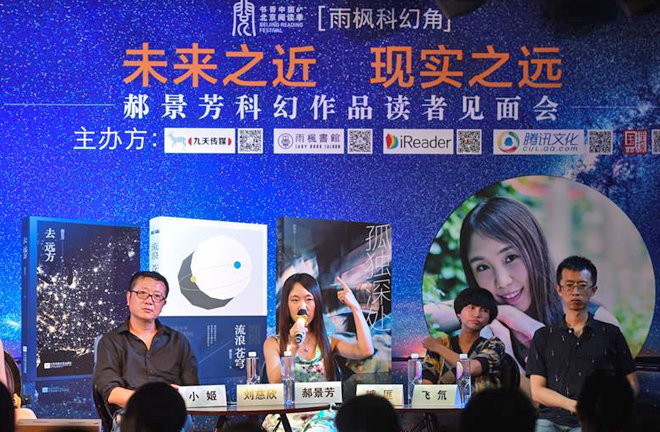Worlds of fantasy collide with reality

Hao Jingfang, Liu Cixin and Fei Dao talk about their writing experiences in the recent roundtable discussion titled “The nearness of Future and Remoteness of Reality.”
Recently, in a roundtable discussion titled “The Nearness of Future and Remoteness of Reality,” Hao Jingfang, the winner of the 2016 Hugo Award for Best Novelette, had a dialogue with Liu Cixin, the winner of the 2015 Hugo Award for Best Novel and Fei Dao, another Chinese science fiction writer. The three also shared their insights on writing with reporters from the Guangming Daily.
Reporter: Now that Chinese science fiction is making a name for itself on the world stage, what are your thoughts on the genre’s future prospects?
Hao Jingfang: In fact, more than 10 years ago, a number of outstanding science fiction works had already emerged in China. It is tragic that they lacked sufficient profile in the global literary community. Today, more and more Chinese works of science fiction are finding an audience in the West and the excellence of translation plays a key role in the process.
I am often asked if Chinese science fiction is now in its “golden age.” I think the criterion for deciding this is whether or not excellent works will continue to be created. For a period to truly be considered a “golden age,” it must be seen with the benefit of hindsight, and a critical mass of science fiction authors is still needed in China.
Fei Dao: Chinese science fiction continues to refine itself based on lessons learned from foreign countries. I think this is a process of integrating into globalization. Liu Cixin sometimes said in a modest way that many of his works are merely imitations of other works, but actually he has his own thinking and unique way of expression.
In Hao Jingfang’s works, we could see the spiritual quest of human beings. In today’s time when assorted crises and opportunities coexist, Chinese authors of science fiction have begun to reflect more on the reality of their own country and the common future of human beings. That’s what gives Chinese science fiction works the opportunity to enter into a dialogue with the global mainstream.
Reporter: What do you think are the differences between the science fiction of China and that of foreign countries?
Hao Jingfang: Speaking in terms of content, foreign science fiction works, which tend to have more savvy readers, are more closely related to cutting-edge science. This also encourages the authors to be more bold and innovative in envisaging the new worlds and fresh spaces. But the domestically popular science fiction works are those that offer some realistic perspectives.
Take my novel Folding Beijing as an example. It is interesting that the things about this book that resonate the most with domestic and foreign readers are diametrically different. Chinese readers are more inclined to pay attention to social strata, privileges and other similar factors, while foreign readers prefer to note the impact that mechanization and automation have on social economy—what if an increasing number of robots replace workers, depriving the latter of their jobs? Foreign readers look at the book from a technological and economic view.
Reporter: In recent years, some plots in science fiction have become true. What do you think of the convergence of hypothesis and reality?
Liu Cixin: As we know, VR (virtual reality) is quite popular at the moment. I myself have experienced it once and felt it was really magic. I personally like it and hope VR could be further able to bring people from the real world to a virtual one.
Some may be concerned that people will ultimately become addicted to this virtual world to the point that the entirety of human civilization is confined to only one computer in one room. I think this depends on how humans choose their future path. I do not feel repelled by it. On the contrary, I hope this brand new world made possible by VR technology could become a reality.
Hao Jingfang: We are living in a world that is undergoing massive and rapid changes. Some emerging technologies, such as artificial intelligence and VR, will continue to transform the way the world is running and people behave. I predict that each individual’s perception toward the changing world will also constantly evolve in tandem as these technologies develop.
